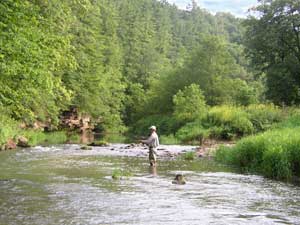Driftless Area

Unique region
The driftless region is an area of roughly 24,000 square miles in a somewhat oval-shaped land mass approximately 80 miles wide and 300 miles long (see map). Although the area includes a small corner of northeast Iowa and northwest Illinois, most of it occupies the extreme southeast area of Minnesota and a crescent of Wisconsin's western border. The term "driftless" refers to the relative absence of the loosely packed, potentially mobile, so-called "drift"--a surface layer of silty clay, sand, gravel, and larger rocks which covers all other areas due to prior glacial activity. Even though earlier glaciers are thought to have had a limited effect on the area known as the Wisconsinan Glaciation, they did not encroach on this small pocket of land. Lacking the dynamic activity of this slow moving massive earth scraper, this region avoided being covered by the so-called “drift”, leaving the valleys and bluff-tops exposed in their native state. The unique features of the driftless area landscape have been enjoyed and appreciated by all those fortunate to have called it home. Art Icvind, little known author and driftless historian, says that Native American oral traditions recount a legend suggesting their gods thought the area too beautiful to cover up. Early French explorers/fur trappers referred to the area as “La Région de Coulée”(coulee being the French word for stream) to describe the ever present limestone stream coursing though each of the numerous valleys running to the Mississippi River. Time will tell whether or not this unique area will be effected by current and future land use. The deleterious results of ill-advised deforestation, over- grazing, and extensive row cropping are well documented. None other than the “father of land stewardship," Aldo Leopold, was referring to this “driftless area” when he warned in his ground breaking book, A Sand County Almanac, that unless sustainable environmental practices were embraced and implemented we were doomed to loose this valuable resource and become the poorer for it.

